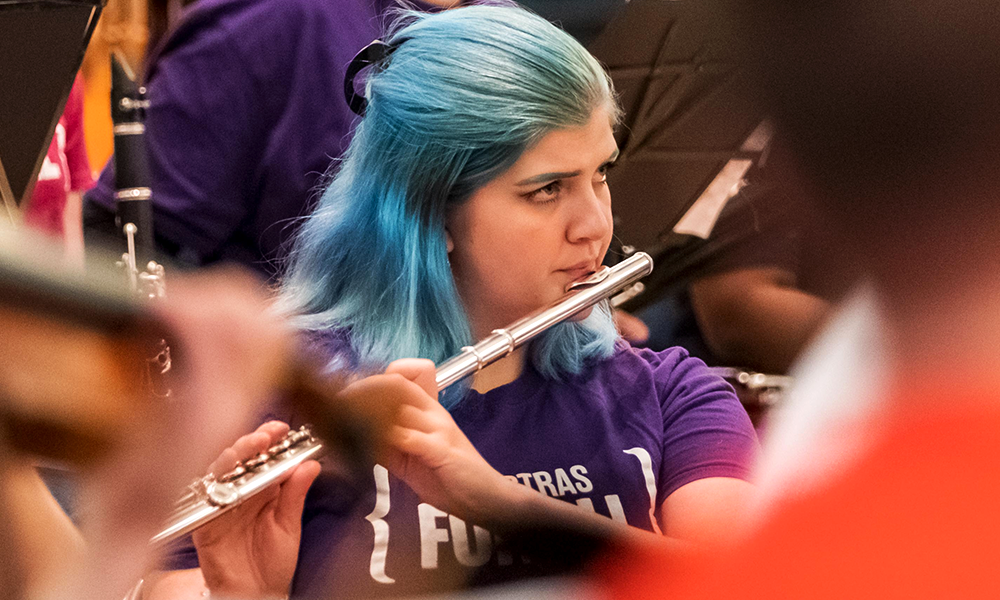“Find unique ways to make you a happier version of yourself.”
In the UK, an estimated 2.6 million people have ADHD – with 1.9 million of those being young people, giving a childhood incidence rate of five per cent.
Also known as attention-deficit/hyperactivity disorder, ADHD is a neurodevelopmental condition that affects both children and adults worldwide and is typically associated with lack of focus, impulsivity and hyperactivity. There is no one cause; it is considered to be the result of both environmental and genetic factors, with the latter being around 70-80 per cent responsible.
An individual can present with one of three types of ADHD: predominantly inattentive, predominantly hyperactive-impulsive, or combined. Since it exists on a spectrum, everyone’s ADHD brain is different and so some people may require more support than others.
Despite the daily challenges people with ADHD often face, they are also creative problem solvers who thrive on variety and innovation as well as being capable of deep focus on tasks or hobbies that interest them. Famous musicians with ADHD, or thought to have had ADHD, include ‘Rhapsody in Blue’ composer, George Gershwin, pop singer-songwriter, Lily Allen, The Beatles star, John Lennon, and panel judge for The Voice UK, Will.i.am, to name but a few.
At Orchestras for All, we celebrate each and every one of the young people in our diverse, music-making family – this means championing members with ADHD as well as those who may be living with a physical disability, learning difficulty or other mental health condition. With ADHD Awareness Month celebrated nationwide this October, we caught up with National Orchestra for All (NOFA) ambassador and flautist, Phoebe, who has ADHD, to find out more.
Read more: 7 ways to support autistic musicians in your youth orchestra >
Phoebe (pictured left) supports the woodwind section at National Orchestra for All’s summer concert
Tell us what having ADHD means for you.
For me, having ADHD means that my brain just works a bit differently to other people’s and I experience the world in a slightly different way. I was diagnosed at 17 and it felt amazing to have an answer for why I was always a bit too loud and could never make myself finish schoolwork or any other tasks, even if I knew it was very important and needed to be done.
It also helped stop me from feeling like I was “lazy” or “didn’t try hard enough” – instead I could be a bit kinder to myself and start working with my ADHD brain, instead of trying to treat it like a neurotypical one and struggling.
Read more: 5 of the best ways to protect your wellbeing >
How does it feel to be part of the inclusive National Orchestra for All (NOFA) family?
It feels absolutely amazing! My favourite thing about it is that even though I’m now an adult and staff member, the fact I may need a quiet space to chill out in during rehearsals or other events, or the fact that I can sometimes feel overwhelmed, is still recognised. I feel just as supported now by the team of orchestral and wellbeing tutors as when I was performing with NOFA (the UK’s only inclusive, non-auditioned national youth orchestra) as a young person.
I’ve been involved with NOFA for around six years – first as a flautist and now as an ambassador – and it’s been so special to watch so many young people learn and flourish. I just love to hear all their stories of what they’ve achieved both within and outside of the orchestra because they feel more confident and valued as a result of the incredible work we do.
Discover Orchestras for All’s three life-changing programmes >
“People with ADHD have things called “hyperfixations”, or special interests,” explains Phoebe.
What daily challenges have you faced?
My biggest struggles have definitely been organisation, motivation and emotional regulation. Organisation is very difficult for me as my brain thinks everything is very important, so I’ll spend as much time worrying about whether I need milk as I would completing schoolwork!
I also find it very difficult to start tasks that I don’t think are exciting enough, or mean I have to concentrate for a long time, which means I also push off things like schoolwork. One tip to work on this was to write “To-do” lists, however I usually think of more and more tasks to do until I end up with a long, overwhelming list that I don’t even want to start.
Read more: How Orchestras for All supports young people facing daily challenges >
Have you received any support to help with your ADHD?
I was very lucky to work with a lifestyle coach that focuses on people with ADHD, which gave me strategies like using a whiteboard or chalkboard to track my tasks, so I can see everything in front of me and it doesn’t suddenly become that long, overwhelming list. I can split it up into different days and move it around if I’m having a bad day.
I also struggle with sensory stimulation, especially noises, which is a bit ironic considering I study music! I use noise-cancelling headphones that I keep on my keys – they are quite small and subtle and mean that while I can still hear people speaking to me, they take the edge off loud noises that might upset me and allows me to keep doing the things I love!
At OFA, we believe that having ADHD is also your superpower! Do you have any hobbies that you feel are encouraged by your ADHD?
For me, ADHD means that I really love crafting! I like doing physical things like crochet, embroidery, sewing and whichever other interest I might have at the moment. People with ADHD have things called “hyperfixations”, which is basically a special interest that completely takes over our brain for a while.
These can last for days, weeks or months and can make it really difficult to think about anything else, which can be both a blessing and a curse! I’ve managed to make a whole cosplay prop in a night before just by hyperfocusing on it, but I also have a lot of other projects I’ve lost interest in – and promise myself I’ll get back to them one day!
If you could share one message with others about ADHD, what would it be?
If I had to pick one thing, it would be this: if you have ADHD, don’t try and fit yourself into the neurotypical mould. Work with yourself instead! If you need an orange scrunchie to play with just to be able to do your schoolwork or practice your musical instrument, go for it!
Don’t try to change how your brain works – instead, find unique ways to make you a happier version of yourself rather than what other people might want you to be.
To support other young musicians with ADHD like Phoebe, please donate today >
Please note: National Orchestra for All applications close at 10am on 7 November 2022.
For further information about ADHD, or if you have ADHD and would like to find the right support, the NHS and ADHD UK websites share useful resources.






